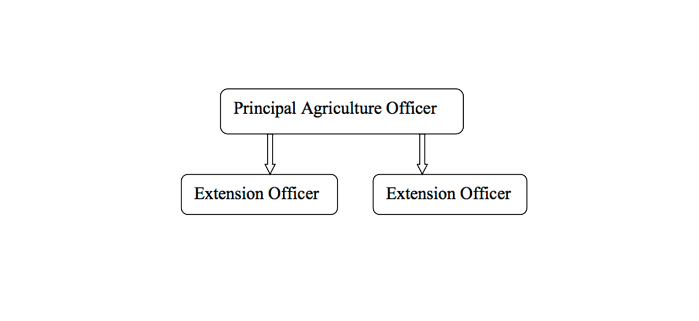Water Management and Climate Change Unit

Goal
To develop a climate resilient agriculture sector in Belize through the fulfillment of climate change adaptation and mitigation activities using sustainable practices and the promotion of climate smart agricultural technologies.
Background
One of the challenges of the Ministry of Agriculture is the change brought by global warming. Climate change in different agro-ecological zones means that farmers have to deal with a new range of uncertainties (i.e. rainfall and seasonal distribution, change of growing seasons, unavailability of water, droughts, floods, etc.) in addition to their everyday burden. Agriculture employs 20 % of the Belizean workforce, and contributes approximately 13% to the gross domestic product (GDP) and accounts for 75% of Belize’s exports. More than BZ$292 million is generated by three traditional commodities: sugar, citrus and bananas, whereas other export earners include red kidney beans, black-eyed peas, pepper sauces and cocoa beans. Domestic agriculture includes rice, corn, beans, plantains, root crops, vegetables, poultry, cattle and pigs. The aquaculture sub-sector primarily farmed shrimp is also a significant contributor to the Belizean economy. Therefore, Belize relies heavily on its agricultural sector which is also very sensitive to climatic variations and could be one of the most affected as a result. Additionally, there is an increase pressure on the existing water, land and agricultural resources which will increase existing vulnerability and may create new ones. The ministry mandate of food security and poverty reduction must have a role, on its own and in association with others, to respond to climate change both through adaptation and mitigation thus this unit has a fundamental role in bridging the gap between relevant stakeholders to sustainably combat the effects of climate change by achieving climate resiliency through the short, medium and long term decisions.
Climate-smart agriculture (CSA)
Agriculture in Belize is susceptible to weather variability and vulnerable to climate hazards, such as hurricanes, floods, and droughts. Climate-smart agriculture (CSA) is agriculture that has been transformed and reoriented to support development and ensure food security in the face of climate change. CSA practices have potential to deliver triple wins in contributing to Belize’s agricultural development goals by sustainably increasing productivity, enhancing resilience, and reducing or removing greenhouse gases (GHGs). Many farmers in Belize are already using CSA measures to some degree. However, more widespread adoption of many CSA technologies has been hindered by a lack of information and technical knowledge, as well as the scarcity of resources to pay for initial investment costs. The country profile provides a snapshot of a set of promising CSA practices, assesses their climate smartness taking into account a range of potential hazards, identifies organizations currently working to promote CSA in Belize and policies under implementation, and discusses possible sources of financing needed to implement CSA at scale.
To find more about this information kindly visit the Document section.

Purpose
The Irrigation and Drainage Unit (IDU) was established in order to promote drainage and irrigation technology among producers for improved crop water management, cope with the effects of climate change and to increase overall crop productivity.
Objectives
- To provide field technical assistance and support in irrigation.
- To gather, compile and analyze data and information pertaining to irrigation and drainage systems.
- To provide technical trainings; collaborate with Research to identify suitable irrigation regimes for specific crops.
- To carry out evaluation of irrigation systems and mobilize resources for irrigation and drainage promotion.
Stakeholder Cooperation and Support
Over the past years, the Unit has received capacity building assistance from the Food and Agricultural Organization (FAO) and European Union. This has been in the form of field irrigation equipment and trainings for the technicians. FAO also provided technical assistance to the Ministry for the development of a draft Policy and Strategy for drainage and irrigation. Technical support was received to carry out an economic analysis and costing for the possible implementation of the policy and strategy. Presently, the Caribbean Development Bank is building on this work by further providing technical assistance to develop an investment plan and projects in drainage and irrigation for possible financing. Through IICA, the Central American Initiative for the adaptation to Climate Change is also providing guidance for the strengthening of national plans in irrigation.
Technical Capacity (Human capital Competency)
At present the Unit has two Extension-Irrigation field technicians – one based in Orange Walk responsible for Corozal, Orange Walk and Belize Districts and the other officer is based at Central Farm with responsibility for the remainder of the country. These officers specifically focus in providing technical support in irrigation design and installation; installation and management of fertigation systems; irrigation for covered structures; irrigation trainings; data collection and project formulation in irrigation for small producers. The IDU also networks with agencies affiliated with water in particular with the recently formed National Integrated Water Resources Authority. Since the post of Irrigation Office is presently vacant, the Unit is monitored and supervised through the office of the Principal Agriculture Officer. Officers can be contacted through the Extension Offices of Cayo and Orange Walk or through the main office in Belmopan.
Organogram

Seasonal Weather Forecast & Its Effects to Agriculture
LXIV Climate Outlook for Central America and Dominican Republic May-June 2021
Forecasted Weather Effects March to May 2021
Forecasted Weather Effects Apr to Jun 2020
Temperature and Precipitation Forecast for April, May and June 2020
Forecasted Weather Effects Jan to Mar 2020
Temperature and Precipitation Forecast 2020
Forecasted Weather Effects Jun Jul & Aug 2019
Climate-Smart Agriculture in Belize World Bank Document
Climate-Smart-Agriculture-in-Belize
REVISED-PUBLIC-Belize-CSA-Country-Profile-FINAL.pdf
Climate-Smart Agriculture in Belize
131878-REVISED-PUBLIC-Belize-CSA-Country-Profile-FINAL
Forecasted Weather Effects August to October 2018
https://drive.google.com/file/d/1N3d6JboMDdE1ndbxceyq0eYRkF_EmBbo/view?usp=sharing
Climate Smart Agriculture Opportunities in Belize Presentation
https://docs.google.com/presentation/d/1qs7RFLlKyNiF_r2prfaO_YTz14S0Shgm2FDfNyg4sj4/edit?usp=sharing
Climate Smart Agriculture Investment Presentation https://drive.google.com/file/d/12whUIJd9j5w1KZxI8x4HZWcpqbLJ0r2I/view?usp=sharing
Presentations of day 1 of the Expert meeting of the Community of practices on agricultural insurance and risk management from the 4th-8th of June 2018.
https://drive.google.com/drive/folders/1zqXFM7u0Uk92d9T9snZJ1VEnDYFk0fxh
Expert Meeting of the Community of practices on agricultural insurance and risk management day 2 from the 4th-8th of June 2018.
https://drive.google.com/drive/folders/1HildIkJb9Ui-Wh-bgfQOWzsA8OKPuMx2
- + Climate Change
-

Goal
To develop a climate resilient agriculture sector in Belize through the fulfillment of climate change adaptation and mitigation activities using sustainable practices and the promotion of climate smart agricultural technologies.
Background
One of the challenges of the Ministry of Agriculture is the change brought by global warming. Climate change in different agro-ecological zones means that farmers have to deal with a new range of uncertainties (i.e. rainfall and seasonal distribution, change of growing seasons, unavailability of water, droughts, floods, etc.) in addition to their everyday burden. Agriculture employs 20 % of the Belizean workforce, and contributes approximately 13% to the gross domestic product (GDP) and accounts for 75% of Belize’s exports. More than BZ$292 million is generated by three traditional commodities: sugar, citrus and bananas, whereas other export earners include red kidney beans, black-eyed peas, pepper sauces and cocoa beans. Domestic agriculture includes rice, corn, beans, plantains, root crops, vegetables, poultry, cattle and pigs. The aquaculture sub-sector primarily farmed shrimp is also a significant contributor to the Belizean economy. Therefore, Belize relies heavily on its agricultural sector which is also very sensitive to climatic variations and could be one of the most affected as a result. Additionally, there is an increase pressure on the existing water, land and agricultural resources which will increase existing vulnerability and may create new ones. The ministry mandate of food security and poverty reduction must have a role, on its own and in association with others, to respond to climate change both through adaptation and mitigation thus this unit has a fundamental role in bridging the gap between relevant stakeholders to sustainably combat the effects of climate change by achieving climate resiliency through the short, medium and long term decisions.
Climate-smart agriculture (CSA)
Agriculture in Belize is susceptible to weather variability and vulnerable to climate hazards, such as hurricanes, floods, and droughts. Climate-smart agriculture (CSA) is agriculture that has been transformed and reoriented to support development and ensure food security in the face of climate change. CSA practices have potential to deliver triple wins in contributing to Belize’s agricultural development goals by sustainably increasing productivity, enhancing resilience, and reducing or removing greenhouse gases (GHGs). Many farmers in Belize are already using CSA measures to some degree. However, more widespread adoption of many CSA technologies has been hindered by a lack of information and technical knowledge, as well as the scarcity of resources to pay for initial investment costs. The country profile provides a snapshot of a set of promising CSA practices, assesses their climate smartness taking into account a range of potential hazards, identifies organizations currently working to promote CSA in Belize and policies under implementation, and discusses possible sources of financing needed to implement CSA at scale.
To find more about this information kindly visit the Document section.
- + Irrigation and Drainage Unit
-

Purpose
The Irrigation and Drainage Unit (IDU) was established in order to promote drainage and irrigation technology among producers for improved crop water management, cope with the effects of climate change and to increase overall crop productivity.
Objectives
- To provide field technical assistance and support in irrigation.
- To gather, compile and analyze data and information pertaining to irrigation and drainage systems.
- To provide technical trainings; collaborate with Research to identify suitable irrigation regimes for specific crops.
- To carry out evaluation of irrigation systems and mobilize resources for irrigation and drainage promotion.
Stakeholder Cooperation and Support
Over the past years, the Unit has received capacity building assistance from the Food and Agricultural Organization (FAO) and European Union. This has been in the form of field irrigation equipment and trainings for the technicians. FAO also provided technical assistance to the Ministry for the development of a draft Policy and Strategy for drainage and irrigation. Technical support was received to carry out an economic analysis and costing for the possible implementation of the policy and strategy. Presently, the Caribbean Development Bank is building on this work by further providing technical assistance to develop an investment plan and projects in drainage and irrigation for possible financing. Through IICA, the Central American Initiative for the adaptation to Climate Change is also providing guidance for the strengthening of national plans in irrigation.
Technical Capacity (Human capital Competency)
At present the Unit has two Extension-Irrigation field technicians – one based in Orange Walk responsible for Corozal, Orange Walk and Belize Districts and the other officer is based at Central Farm with responsibility for the remainder of the country. These officers specifically focus in providing technical support in irrigation design and installation; installation and management of fertigation systems; irrigation for covered structures; irrigation trainings; data collection and project formulation in irrigation for small producers. The IDU also networks with agencies affiliated with water in particular with the recently formed National Integrated Water Resources Authority. Since the post of Irrigation Office is presently vacant, the Unit is monitored and supervised through the office of the Principal Agriculture Officer. Officers can be contacted through the Extension Offices of Cayo and Orange Walk or through the main office in Belmopan.
Organogram

- + Weather Forecast
- + Documents
-
Seasonal Weather Forecast & Its Effects to Agriculture
LXIV Climate Outlook for Central America and Dominican Republic May-June 2021
Forecasted Weather Effects March to May 2021
Forecasted Weather Effects Apr to Jun 2020
Temperature and Precipitation Forecast for April, May and June 2020
Forecasted Weather Effects Jan to Mar 2020
Temperature and Precipitation Forecast 2020
Forecasted Weather Effects Jun Jul & Aug 2019
Climate-Smart Agriculture in Belize World Bank Document
Climate-Smart-Agriculture-in-Belize
REVISED-PUBLIC-Belize-CSA-Country-Profile-FINAL.pdf
Climate-Smart Agriculture in Belize
131878-REVISED-PUBLIC-Belize-CSA-Country-Profile-FINAL
Forecasted Weather Effects August to October 2018
https://drive.google.com/file/d/1N3d6JboMDdE1ndbxceyq0eYRkF_EmBbo/view?usp=sharing
Climate Smart Agriculture Opportunities in Belize Presentation
https://docs.google.com/presentation/d/1qs7RFLlKyNiF_r2prfaO_YTz14S0Shgm2FDfNyg4sj4/edit?usp=sharing
Climate Smart Agriculture Investment Presentation https://drive.google.com/file/d/12whUIJd9j5w1KZxI8x4HZWcpqbLJ0r2I/view?usp=sharing
Presentations of day 1 of the Expert meeting of the Community of practices on agricultural insurance and risk management from the 4th-8th of June 2018.
https://drive.google.com/drive/folders/1zqXFM7u0Uk92d9T9snZJ1VEnDYFk0fxh
Expert Meeting of the Community of practices on agricultural insurance and risk management day 2 from the 4th-8th of June 2018.
https://drive.google.com/drive/folders/1HildIkJb9Ui-Wh-bgfQOWzsA8OKPuMx2

